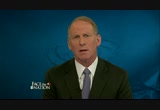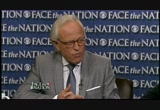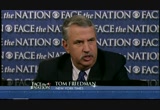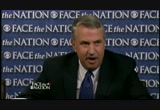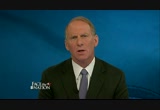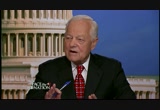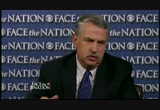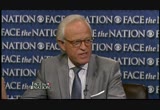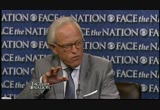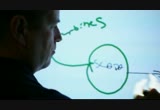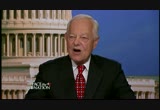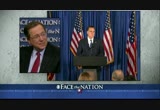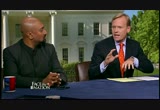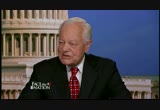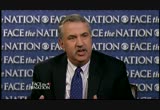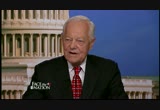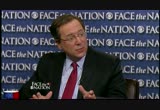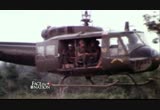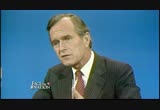tv Face the Nation CBS September 17, 2012 2:00am-2:30am PDT
2:00 am
>> schieffer: welcome back now to "face the nation" page two. richard haass of the council on foreign relations is in new york. martin indyk of brookings, and tom friedman of the "new york times" are with us here in the studio. richard haass, i'm going to go to you about what martin indyk was talking about, this problem between israel and the united states over iran and what do we do about it? the prime minister is saying the united states ought to publicly draw a red line and tell iran you cannot go beyond this point in your nuclear weapons development. where do you see-- what do you see happening on this front? >> well, that's an approach i think that probably can't work, simply because the iranians may be doing things already that we don't know about. and i think it's legitimate to say, even if they don't cross the nuclear weapons threshold, if they get 90% of the way
2:01 am
there, that's not a very comforting outcome. so let me suggest a different approach, bob. instead of red linees, let me suggest deadlines. what we ought to do is going to the iranians with a diplomatic offer and make clear what it is they have to stop doing-- all the enrichment material they have to get rid of, the international inspections they have to respect, and sanctions would be reduced and they would be out from under the risk of attack. if they don't meet the deadline, i think the united states, israel, and others who are like-minded should think of whether the time has come to undertake military action. >> schieffer: martin indyk, has the time come? >> not yet. iran doesn't have a nuclear weapon. it is certainly going ahead, despite the crippling sanctions and the effort at negotiating an outcome in which they would give up their aspirations for nuclear weapons. they're still moving ahead towards a nuclear threshold. so, therefore, while there's still time, there's not a lot of time, and i don't think the difference between netanyahu and
2:02 am
obama on this is that great in terms of the president's commitment not to allow iran to acquire nuclear weapons. the idea of putting out a public red line, in effect, issuing an ultimatum, is something that no president would do. you notice governor romney is not putting out a red line. senator mccain didn't, either, and neither is netanyahu, because it locks you in. i think what's clear is that the united states has a vital interest in preventing iran from getting a nuclear weapon. there is still time, perhaps six months, even, by prime minister netanyahu's own time table to try to see if a negotiated solution can be worked out. i'm pessimistic about that. if that doesn't work out, and we need to make every effort, exhaust every chance that it does work-- then i'm afraid that 2013 is going to be a year in which we're going to have a
2:03 am
military confrontation with iran. >> schieffer: you really believe that? tom friedman, is a military showdown inevitable in this? i mean, i-- just to be the devil's advocate, let me just say, we coexisted with, first, the soviet union and now russia for a long, long time, and they have nuclear weapons. what is the difference in iran having a nuclear weapon and russia having a nuclear weapon or china or pakistan? >> well, i think the argument is that this is a much more unstable regime and the russians, even during the cold war, didn't-- weren't out there vowing to wiept united states off the map. i certainly understand why the israeliisraelis are concerned. i would say a couple of things, though, bob. if i did think that this was a year in which we were going to have to undertake military action from iran-- if i were israel and thinking that-- i wouldn't just be worried about drawing a red line. i would be interested in drawing a green line, too, and that is a green line between israel and west bank.
2:04 am
the idea that israel would go on with mad settlement policy in the west bank and at the same time expect the united states and the world to undertake a military strike against iran, what we saw in the middle east last week in terms of the burning down of american embassies, that would be a garden party, if you ask me, compared to what you would see on the street in the arab world if israel attacked iran with the support of the united states in the complete absence of any kind of negotiation with the palestinians i'm not saying even negotiations with the palestinians would insulate us from that reaction, but the fact that there's absolutely nothing, okay, i can't imagine what-- you can say all these arab regimes, they'll love it. quarterback the leaders quietly, they'll wisp tore us, "way to go. really good job. thank you very much. but our people-- our people are really upset, and you know, bob, when our people are upset we have to be with the people." >> schieffer: let me ask you,
2:05 am
and i'll go back to you, richard, what is netanyahu trying to do here. martin says even he has not drawn a red line. you all talk about how it would be very difficult for us to draw one publicly. why is he saying what he's saying right now? >> he's adding urgency to this. we've had several rounds of negotiations that have accomplished very little. he doesn't want these things to be drawn out indefinitely. he wants countries to increase the sanctions, to put more pressure on iran. he wants the pressure of the united states. he wants the united states, whether we announce a formal red line or not, to essentially decide within the government that our patience and our tolerance are not unlimited. so i think what he is hoping is that somewhere after the election-- whether it's a second obama administrationo a first romney administration-- essentially the united states would one way or another make the decision that unless iran met our requirements by a date certain, we would probably begin to move much more directly
2:06 am
towards the idea of an american military strike-- which, by the way, the israelis would much prefer. thane we have the capacity to do things militarily that are far greater than they could. they also know if they're the ones to undertake the strike, it introduce a somewhat different dynamic into the region. so their preference, if you will, is not to act unilaterally. it's to get us to strike, and i think what you're seeing, therefore, is the israelis pressing their case. >> schieffer: let's go back to what tom friedman was talking about in the beginning, and that is syria. john mccain feels very strongly that we should have done a lot more, tom, than what we have done. >> well, you know, my sympathies here are with the administration. my view on syria is very simple-- if you want to effect change there, you have to take over the whole country. you have to do what we did in iraq. and no one wants to do that again. what you're seeing in all these arab states really, bob, is you take out the dictator. and there's nothing underneath. there's no civil society.
2:07 am
they're all one version of a failed state after another. and what they all need is some kind of midwife or some kind of mandela to pull them together and bring them into the modern world. they have none. now, what really scares me when i look at egypt eye just came from china, as you know-- you look where china is today. china is not sit back and looking-- egypt was ahead of china 50 years ago. egypt can't even see china today. so now we're going to go through a period where the muslim brotherhood has to say we have to figure out islam and we have our followers. guys, you know how close we are to the united states, one more situation like this, the united states will pull out. these countries are in real danger, bob, of falling behind exponentially in this globalized world today. un, there's a saying in environmentalism that really applies to them-- we have exactly enough time starting now. people talk about climate change. they have exactly enough time starting now to get into the
2:08 am
modern world, and to spend another decade with islam-- islam is a great and glorious faith but it is not the answer it their development issues today. >> schieffer: mr. ind. >mr. indyk, doyou think assad in he survive? >> it's very difficult to see how he can survive. he's lost all legitimacy. he's basically in a situation of kill or be killed, and upwards of 30,000 syrians already dead, i think we see what choice he's made here. there's no way back from that situation. i do think that the administration could have been more actively engaged with the opposition earlier on, the kinds of things that we're trying to do now in terms of finding out who the opposition is, who it would be safe to arm, all of those things could have been done earlier on. in terms of trying to plan for a post-assad future, that is
2:09 am
critically important now, and we shouldn't see it just as a black-and-white situation. it's really what-- what we're facing now is a descent into chaos and a potential for a sectarian war between shubies and shias to spread from syria to iraq to lebanon and then to bahrain and even saudi arabia. so there's real potential here for much more instability that we're already witnessing. we do have a stake in trying to get in there and doing whatever we can, without putting boots on the ground, to effect an orderly transition from a post-assad syria. that is not going to be easy at all, and we're late to the game, but it doesn't mean we should give it up. >> schieffer: all right, well, gentlemen, i want to thank all of you for a very good discussion this morning. we'll be back in a minute with our reporters' roundtable in a minute. commitment to the gulf.
2:10 am
and every day since, we've worked hard to keep it. bp has paid over twenty-three billion dollars to help people and businesses who were affected, and to cover cleanup costs. today, the beaches and gulf are open for everyone to enjoy -- and many areas are reporting their best tourism seasons in years. we've shared what we've learned with governments and across the industry so we can all produce energy more safely. i want you to know, there's another commitment bp takes just as seriously: our commitment to america. bp supports nearly two-hundred-fifty thousand jobs in communities across the country. we hired three thousand people just last year. bp invests more in america than in any other country. in fact, over the last five years, no other energy company has invested more in the us than bp. we're working to fuel america for generations to come. today, our commitment to the gulf, and to america, has never been stronger.
2:11 am
>> schieffer: and we're back now. tom friedman is sticking around because he qualifies as a reporter. he used to be a reporter before he started writing a column for the "new york times." the "new york times" chief washington correspondent, david sanger is with us this morning. as is "time" magazine's bobby ghosh, who wrote the cover story on "time" this week and our own political director, john dickerson. let's talk a little bit. we've been talking about this red line that netanyahu wants the president to draw. david, you had a pretty interesting story in the paper this week about the red line that mitt romney's people have drawn, and there seems to be some disagreement with where he is and where his advisers are. what's that all about? >> well, his advisers have laid out a case, bob, that mitt romney would put the red line pretty close to where the israelis would have it, which is
2:12 am
to say, that the u.s. and israel would need to act some time before iran actually got a weapon. i think the phrase they used was, "you can't let iran get a screwdriver turn away from the weapon." but then the candidate himself gave an interview to abc, and i don't know if he forgot his own position out here or if he just misspoke, but he seemed to draw the line closer to where president obama is, which is to say, he said, "well, we're in the same place. we can't let them get a weapon." well, it's a crucial distinction, and maybe the distinction we heard in the early part of your show, between war and peace, and it's certainly one that during the campaign the candidates are going to have to be a little more explicit about. >> schieffer: john dickerson, mitt romney, of course, spoke out very quickly, even before the-- we knew that an american ambassador had been killed and the trouble in bek. he spoke out just as kind of the demonstration were beginning in
2:13 am
cairo, and he basically accused of administration of apologizing. where is all that now? well, i think in the short term, there's a rift for romney. in the long term with libya and egypt and all of these protestes, there's a long-term problem for the property. what mitt romney could have done when he had that press conference was come out and say we have a tradition in this country where in the middle of campaigns we don't attack the chief executive. we are all one and i'm going to let the president handle this. he didn't do that. he, as you said, jumped in the moment, inserted himself, made a large argument, which the president has been weak and there are specifics in this case but it attaches to a longer and bigger critique of the president. that's a big risk because he's not only challenging tradition by speak out, but he's also challenging public opinion. the country, based on polling, is not in an adventuresome mood. they are not in a strong horse mood based on 11 years of war, and just where they are right now. so mitt romney has to make a strong case here. he didn't really continue making that case. so that's the challenge for him. the challenge for the super tuesday that this drones on, and
2:14 am
that there are more opportunities for him to make unforced errors. you know, he said, after criticizing romney, kind of looking down his nose at him and says he shoot first and aims later. then the president made a comment about egypt that a lot of people thought was shooting first and aiming later. the unrest is another instance in which people can say barack obama isn't the guy he said he was going to be. he came in saying there would be a new day internationally. there has not been a new day and the longer that continues that could hurt him politically. >> schieffer: what about this statement that the president made, that ejim is not our-- egypt is not our enemy but they're not our ally. >> bob it has to do with the kind of world we're in right now and i think something very important has happened in the last six, seven, eight years, we've anyone from a connected world, toap interconnected world to an interdependent world really fast. in an interdependent world, things get weird. your friends can kill you faster than your economy.
2:15 am
if greece retires tomorrow, yours and my retirement savings are in jeopardy. your rivals collapsing is more important than getting stronger. if china goes to zero growth tomorrow, we're much more trouble than if china get stronger. in the interdependent world we have a whole host of country-- and again i sympathize can someone who has to manage it-- basically failing. think about europe and the national world. the super national state is failing, the european union, and in the arab world, the nation state is failing. you're dealing with failed states. you have dealing with states you have to build into an entity before you deal with them. what is china today? not a friend. notap enemy. kind of a frenemy? what is egypt today? i don't think we have definitions in this incredibly interdependent world where your friends collapsing and your enemies collapsing are sometimes more dangerous than the other way around. >> schieffer: bobby, you and i were talking before the
2:16 am
broadcast, and we were talking about the trouble that's spread across the arab world, and you've said basically we need to get used to it. >> absolutely. i think this is a new kind of middle east crisis and it will come back to us over and over again. we have seen the elements of it, there are people in country, professional offense givers, and in countries are professional offense takers. there are people who crank it up in the street and organize. this is not a spontaneous outburst of anger. as tom was saying, you have states that are too weak to figure out how to do this. how do you deal-- if you're a democratically elected country. you're not mubarak anymore. how do you deal with public expression anger is it how do you modulate it so it doesn't become an american flag being torn down or worse still, americans being killed? this kind of crisis, i think we will come back to over expofer again and it has to be a part of this administration-- any
2:17 am
administration that comes after it for years to come-- to know how to deal with it, just as the egyptians, the tunisianes, the libbians are learning how to work their own society. >> schieffer: is it about us? is it about them? are we just observers here? what kind of a role can we play here? >> i don't think there is any question that the u.s. has a larger role to play in the middle east. there is no question of disengagement at the risk of an embassy being shut down, i think is very small. the reasons that the u.s. has always been engaged in the middle east haven't gone away, if anything, they've become more persuasive. we have the ever-sort of-- its greatest threat to america's stability comes from places like that. there's iran. and now there's an opportunity with all these new democracies, there's an opportunity for a different kind of discussion. the trouble is finding the language. they don't know how to talk with us any more than we know how to
2:18 am
talk with them. and it's anything to be, for a while-- this is why losing ambassador stevens is such a huge blow because he was one of the people who actually was beginning to understand how to speak with the people in the street, which explanation his popularity, which explains why so many libyans today are mourning his death. >> schieffer: it is, david, isn't it, it's difficult for people in other parts of the world to understand this country. there probably weren't 100 people in america who saw this movie, or who had ever even heard of it. maybe they saw it on the internet after it happened. and yet in other countries it seems to come across whatever comes out of united states the government approved of it and the majority of the people approved of it where nothing could be further from the truth. >> when you grow up in a country where the government controls all, it's easy to project in the united states we run want same way, and of course we all know what a large disorganized free
2:19 am
speech society we have. and that gets a little bit to what the american embassy in cairo was trying to do with the statement that became such a political football later on. the statement read to me as something-- when i was a foreign correspondent you would see it happen all the time. it was an effort to try to calm the streets before there was a protest. in fact, it came out before the first protest in cairo, and it basically said, "we believe in religious tolerance, and in free speech, and you shouldn't think that these statements were endorsed by the united states government." well, if no one had watched the video, bob, no one paid attention to that cairo statement, either, from the embassy. and you saw what took place. and what it tells you is these tinderboxes are going to keep happening, whether it's another video, whether it's another statement. and the irony for president obama is he's the one who came in with a speech in cairo in hs first year in office saying a new day had arrived and talking with sympathy about the muslim
2:20 am
world that he had grown up around. >> schieffer: john, where is the presidential campaign right now? >> well, we've had two convention. i think where most people think it is, the average of the polls the president is up by about three points. but what's happened nonetheless indeed those polls is his attributes. on the question of the economy, there's some movement that he's fought romney to a draw. this is one area governor romney had the advantage. if you look inside the states, the president is ahead in ohio, florida, outside the margin of error. given the way the math looks, if he wins one of those two states, it's looking very, very good for the president. and we'll also have dwindling opportunities for mitt romney so mitt romney didn't get a big bounce from picking paul exprien he didn't get a big bounce from his convention. he's really only got the debates coming up. the good news for romney is independents until the poles, he's wins those by 10 points. and the elite opinion kind of feels like he's losing it right now. when you're on the other side of elite opinion that can sometimes be a good thing because the
2:21 am
elites are so often wrong. >> schieffer: thank you all very much for adding your insights this morning. i'll be back in a moment with final thoughts about how foreign policy often intrudes on presidential elections when we least expect it. nice. oh... oh! oh! red! red! red! yes! yes! come on! oh. no! oh... bummer. [children shouting] hoops? yeah. sure. sure. announcer: moms everywhere are finding ways
2:22 am
to keep kids active and healthy. works every time. announcer: get ideas. get involved. get going at letsmove.gov. [ jet plane passing ] [ swings squeaking ] [ squeaking ] [ creaking ] [ rock music playing ] from exploring europe to conquering x-camp... girl scouts today offers so many incredible opportunities,
2:23 am
the only problem you'll have is deciding what to do. so... ♪ yeah, yeah, yeah ♪ whoo! >> schieffer: finally today, our campaigns are usually about pocketbook issues but this is not the first time an unexpected event overseas has landed smack in the middle of a hot presidential race. in 1968, embattled democrats claimed they had a plan to end the war in vietnam. but after our south vietnamese allies mysteriously pulled. out of peace talks with north vietnam, just before the election. >> the political miracle-- >> schieffer: it dashed whatever hopes democrats had for a victory and republican richard nixon was elected. but most of the time, foreign efforts to influence our elections either backfire or
2:24 am
have no impact. in 1980, 52 american diplomats were being held hostage in iran, but just before the election, the iranians seemed ready to make a deal to release them. what some saw as a ploy to re-elect jimmy carter. ronald reagan' reagan's running, george bush, said it wouldn't work. >> you see, i think the american people don't want these ayatollahs, to affect the election one way or another. >> schieffer: he was right, of course, and reagan won. terrorists crashed a truck into the u.s. embassy in beirut and killed 23 people during reagan's reelection campaign in 1984. americans were outraged and re-elected reagan. there was no question osama bin laden was trying to influence american voters in 2004 when he took credit for 9/11 and
2:25 am
condemned george bush. >> americans will not be intimidated or influenced by an enemy of our country. i'm sure senator kerry agrees with this. >> schieffer: he was right on both counts, and was re-elected. americans may disagree on many things, but here's one thing on which we don't-- we don't like anyone telling us how to vote. they have teachers... ...with a deeper knowledge of their subjects. as a result, their students achieve at a higher level. let's develop more stars in education. let's invest in our teachers... ...so they can inspire our students. let's solve this.
2:28 am
187 Views
IN COLLECTIONS
KPIX (CBS) Television Archive
Television Archive  Television Archive News Search Service
Television Archive News Search Service  The Chin Grimes TV News Archive
The Chin Grimes TV News Archive 
Uploaded by TV Archive on

 Live Music Archive
Live Music Archive Librivox Free Audio
Librivox Free Audio Metropolitan Museum
Metropolitan Museum Cleveland Museum of Art
Cleveland Museum of Art Internet Arcade
Internet Arcade Console Living Room
Console Living Room Books to Borrow
Books to Borrow Open Library
Open Library TV News
TV News Understanding 9/11
Understanding 9/11
